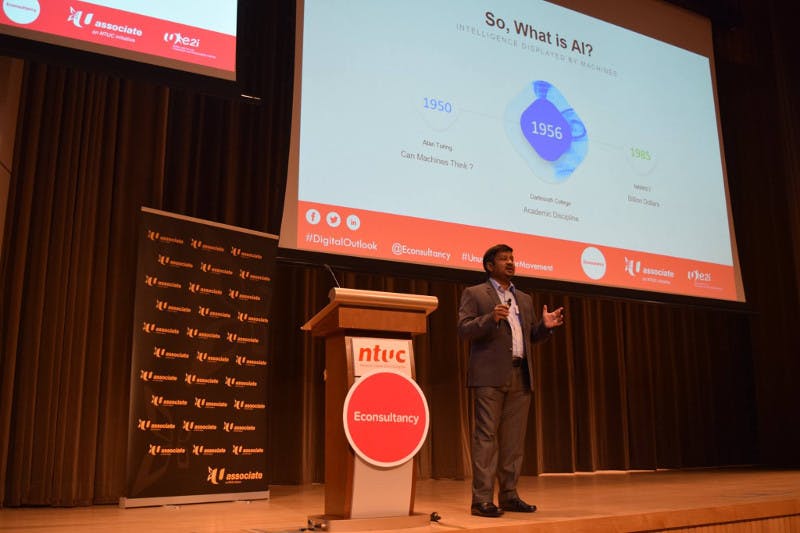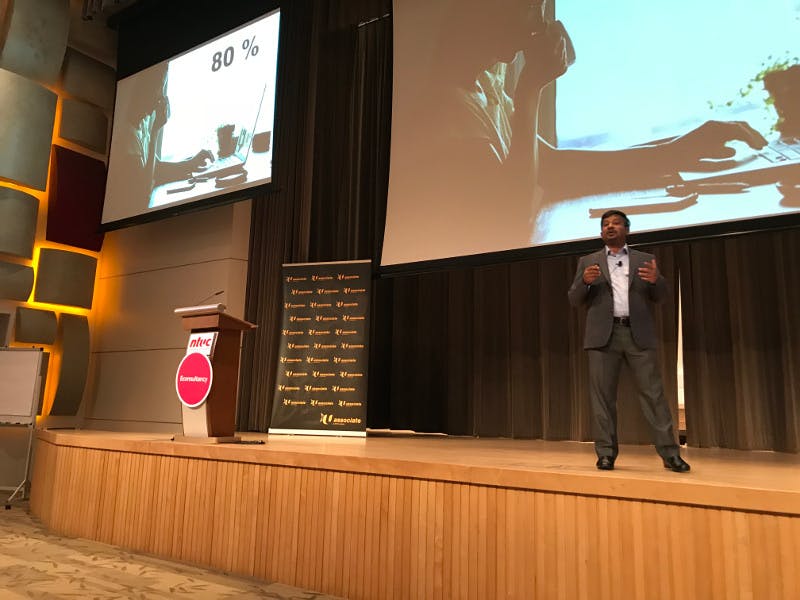To find out, Econsultancy recently held a gathering of over 400 marketers for Digital Outlook 2018 in Singapore and invited subject matter experts to speak on AI marketing and other topics trending in digital.
In his talk, Chandra Kumar, CEO WiselyWise, stated that, despite many setbacks over its long history, AI marketing may now be ready for mass adoption. He proceeded to describe four concrete things that marketers can use AI for right now. Here they are, summarised below.
(For more insight, Econsultancy’s Supercharged conference takes place in London on May 1, 2018 and is chocked full of case studies and advice on how to build out your data science capability. Speakers come from Ikea, Danske Bank, Just Eat, Age UK, RBS and more)
1) Content at scale
First off, Chandra discussed how brands can use AI marketing to produce advertising copy and even blog content which can change according to audience reaction.
One example of how AI marketing can deliver advertising copy comes from a recent campaign for the Toyota Mirai. Saatchi LA, the ad producer, trained IBM’s famous Watson AI marketing engine with 50 scripts of relevant copy. Watson then delivered thousands of ads that sounded ‘human’.
Here is one ad which has some unusual yet strangely engaging copy:
Additionally, AI tools are now available which will write long-form blog posts (and even 10-15 page reports) for marketers.
Using a process called natural-language generation (NLG), Narrative Science’s Quill is reportedly churning out over a million of words a day for clients such as Groupon, Forbes, and Credit Suisse.

2) Communication at scale
Marketers can also use artificial intelligence to provide one-to-one communication with customers – right now.
Dubbed ‘chatbots’, these AI engines use natural language and dynamic menus to handle customer inquiries. This takes a load off of customer service (see KLM), but it also offers brands a way to automate the process of guiding a consumer along the customer journey.
Setting one up is not easy, especially if your chatbot doesn’t have the AI necessary to handle varied response (as we chronicled in an Econsultancy post) but once up, a chatbot can produce some interesting and useful results.
Brands who are ready to try one out are encouraged to use one of the many chatbot consultants – or engage with a top-tier vendor such as Nuance or Kore.ai.
3) Relevance at scale
Another popular way marketers use AI right now, according to Chandra, is for recommendation engines. Recommendation engines find patterns in consumer browsing or searching behaviour so that the ‘next best action’ can be delivered to consumers without human intervention.
Just about every major ecommerce marketplace uses this technology to recommend products and deliver offers, but perhaps the more interesting applications for AI marketing is to delivery more relevant content to its site visitors.
Adobe, IBM Watson, and Hubspot have all invested in AI technology to help companies harness AI for content delivery and there are also boutique players in the space to consider, such as Uberflip and Curata.

4) Selling at scale
Finally, AI marketing can be used to find new, untapped consumers for a brand’s products, ultimately helping marketers to sell at scale.
From one perspective, AI has been used for some time by brands to develop ‘lookalike’ audiences which consist of people who resemble a company’s current customers.
In a recent case study, Harvard Business Reviewed chronicled Harley Davidson’s experience using a sophisticated lookalike engine along with ad optimization to increase sales leads by nearly 3,000%
Another interesting way brands can sell at scale using AI, according to Chandra, is to provide products and services via one of the new ‘smart assistants’: Amazon’s Alexa, Google Home, or Apple HomePod.
In these cases, brands will actually be selling to the AI engine first before being passed on to consumers. This means that marketers will need to devise a sophisticated strategy and ensure they can deliver top-tier customer service, as customers will have a wide variety of choice on the platforms and very high expectations.
The conclusion
During our panel at the end of the conference, the presenters agreed that using AI marketing to create content would probably be the most useful and innovative application of AI for marketers within the coming year. Further out, though, how AI will help marketers is really anyone’s guess!
A word of thanks
Econsultancy would like to thank Chandra Kumar, CEO WiselyWise for his presentation which shed light on a topic which is front-of-mind for marketers these day, AI marketing.
We would also like to thank all of the attendees and we hope to see you again at future Econsultancy events!


Comments